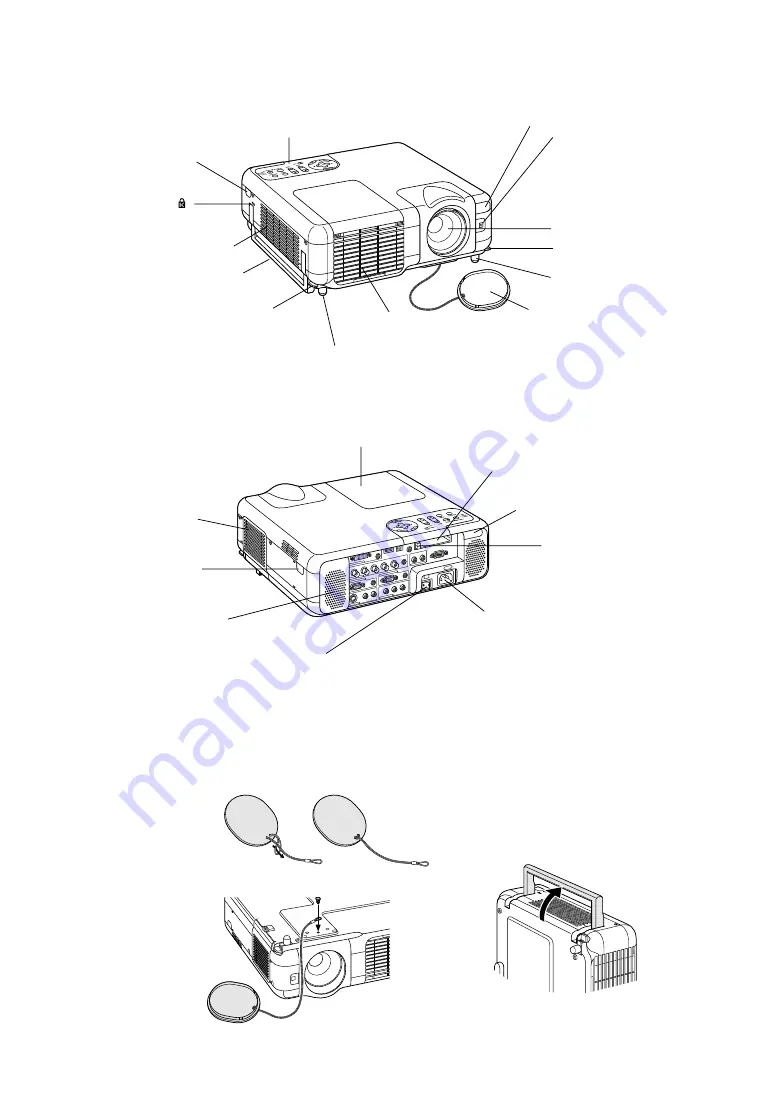
E-6
AC IN
RGB2
IN
RGB O
UT
AUDIO
AUDIO
DVI IN
USB
(MOUS
E/HUB
)
REMO
TE
AUDIO
AUDIO
G/Y
B/Cb
H
V
RGB1
IN
S-VID
EO IN
VIDEO
IN
AUDIO
AUDIO
AUDIO
L/MON
O
R
L/MONO
R
AUDIO
OUT
L/MON
O
R
PC CO
NTRO
L
1
2
Part Names of the Projector
Ventilation (outlet)
Heated air is exhausted from here
* This security slot supports the MicroSaver
®
Security System. MicroSaver
®
is a registered trademark of Kensington Microware Inc. The logo is
trademarked and owned by Kensington Microware Inc.
Built-in Security Slot ( )*
Adjustable Tilt Foot Lever
(See page E-19)
Attaching the lens cap
To attach the lens cap to the bottom with the supplied string and rivet:
Remote Sensor (See page E-11 and -48)
Controls (See page E-7)
Filter Cover (inlet)
Carrying Handle
Lens Cap
Lens
Adjustable Tilt Foot (See page E-19)
Stereo Speaker (5W)
AC Input
Connect the supplied power cable's three-
pin plug here, and plug the other end into
an active wall outlet. (See page E-17)
Main Power Switch
When you plug the supplied power cable into
an active wall outlet and turn on the Main
Power switch, the POWER indicator turns
orange and the projector is in standby mode.
(See page E-18)
Remote Sensor
(See page E-11 and -48)
PC Card Slot 1
PC Card Slot 2
Lamp Cover (See page E-55)
PC Card Eject Button
1. Thread the string through the
hole on the lens cap and then
tie a knot in the string.
2. Use the rivet to attach the
string to the bottom of the
projector.
Image Sensor
For Auto Focus and Auto Wall Color
Correction. (See page E-49)
Carrying the Projector
Always carry your projector by the handle.
Ensure that the power cable and any other cables connecting to video
sources are disconnected before moving the projector.
When moving the projector or when it is not in use, cover the lens with
the lens cap.
Ventilation (inlet)
Remote Sensor (See page E-11 and -48)
Adjustable Tilt Foot Lever
(See page E-19)
Adjustable Tilt Foot
(See page E-19)
Remote Sensor (See page E-11 and -48)











































